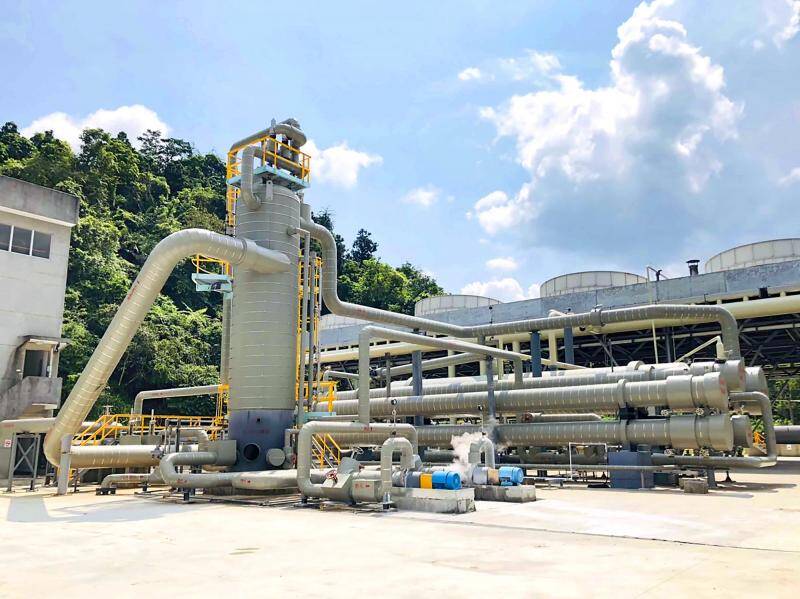The nation’s “second energy transition” would focus on geothermal energy and small hydropower, with the first geothermal exploration to start this month, Minister of Economic Affairs J.W. Kuo (郭智輝) said yesterday.
President William Lai (賴清德) on Thursday said in his Double Ten National Day address that the government would continue to promote the “second energy transition” to ensure stable power supply by developing more sources of green energy, promoting energy conservation and improving energy storage to steadily advance toward the nation’s goal of achieving net zero by 2050.
The Ministry of Economic Affairs said in a statement yesterday that it would continue to develop green energy such as geothermal power and small hydropower, in addition to more mature technologies such as photovoltaic power and offshore wind power.

Photo courtesy of Yilan County Government via CNA
A research team is to start geothermal exploration in four out of 10 selected locations, Kuo said.
The first site to be explored by the end of this month is 4,000m underground, and the experience, if successful, could be applied to the following explorations, he said in response to media queries on the sideline of a legislative meeting in Taipei.
The application of small hydropower, which means powering up engines using the vertical force of flowing water, would begin in line with the Water Resources Agency’s hydraulic engineering program starting from next year, Kuo said.
The construction of small hydropower facilities is under planning, and several hydroelectric power stations have already been built, he added.
The road map to stable power supply is complete from now to 2030, Kuo said, urging local governments and the public to support the central government’s plan to build power plants.
Asked whether nuclear energy is included in Lai’s energy transition policy, Kuo said the ministry as an executive branch would keep up with new technologies and international trends, but added that he could not speak on behalf of the president.

Taiwan is stepping up plans to create self-sufficient supply chains for combat drones and increase foreign orders from the US to counter China’s numerical superiority, a defense official said on Saturday. Commenting on condition of anonymity, the official said the nation’s armed forces are in agreement with US Admiral Samuel Paparo’s assessment that Taiwan’s military must be prepared to turn the nation’s waters into a “hellscape” for the Chinese People’s Liberation Army (PLA). Paparo, the commander of the US Indo-Pacific Command, reiterated the concept during a Congressional hearing in Washington on Wednesday. He first coined the term in a security conference last

Prosecutors today declined to say who was questioned regarding alleged forgery on petitions to recall Democratic Progressive Party (DPP) legislators, after Chinese-language media earlier reported that members of the Chinese Nationalist Party (KMT) Youth League were brought in for questioning. The Ministry of Justice Investigation Bureau confirmed that two people had been questioned, but did not disclose any further information about the ongoing investigation. KMT Youth League members Lee Hsiao-liang (李孝亮) and Liu Szu-yin (劉思吟) — who are leading the effort to recall DPP caucus chief executive Rosalia Wu (吳思瑤) and Legislator Wu Pei-yi (吳沛憶) — both posted on Facebook saying: “I

Sung Chien-liang (宋建樑), who led efforts to recall Democratic Progressive Party (DPP) Legislator Lee Kun-cheng (李坤城), was released on bail of NT$80,000 today amid outcry over his decision to wear a Nazi armband to questioning the night before. Sung arrived at the New Taipei District Prosecutors’ Office for questioning in a recall petition forgery case last night wearing a red armband bearing a swastika, carrying a copy of Adolf Hitler’s Mein Kampf and giving a Nazi salute. Sung left the building at 1:15am without the armband and covering the book with his coat. Lee said today that this is a serious

Firefighters are working to put out a fire on Taipei’s Yangmingshan (陽明山) reported earlier this morning. The cause of the fire is still under investigation. The Taipei Fire Department said it received a report of a fire at Xiaoyoukeng (小油坑) at 11:17am, dispatching four command vehicles, 16 firetrucks, one ambulance and 72 personnel. The fire is still burning on about 250m² of land, according to initial estimates, as eyewitnesses reported seeing smoke rising from the mountain. The Yangmingshan National Park Headquarters on Facebook said the Qixingshan (七星山) hiking trail starting from Xiaoyoukeng and the Xiaoyoukeng parking lot are closed as firefighters work to put